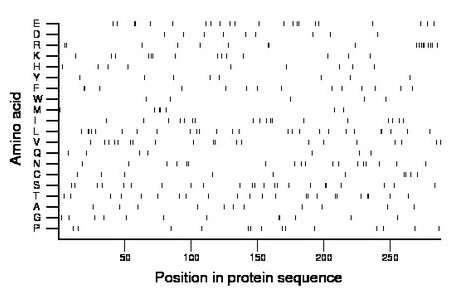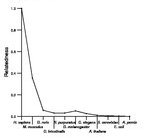
| Name: CD80 | Sequence: fasta or formatted (288aa) | NCBI GI: 4885123 | |
|
Description: CD80 antigen precursor
|
Referenced in: B cells
| ||
|
Composition:

Amino acid Percentage Count Longest homopolymer A alanine 3.8 11 1 C cysteine 3.5 10 2 D aspartate 3.1 9 1 E glutamate 7.6 22 2 F phenylalanine 4.9 14 2 G glycine 4.2 12 2 H histidine 3.1 9 1 I isoleucine 6.2 18 2 K lysine 4.9 14 2 L leucine 9.0 26 2 M methionine 2.4 7 2 N asparagine 6.2 18 2 P proline 4.9 14 1 Q glutamine 2.4 7 1 R arginine 6.2 18 3 S serine 8.0 23 2 T threonine 8.0 23 2 V valine 6.9 20 2 W tryptophan 1.7 5 1 Y tyrosine 2.8 8 1 |
Comparative genomics:
Search single species RefSeq proteins at NCBI
Search summary 
Figure data | ||
Related human proteins:Protein Relative score Description Self-match 1.000 CD80 antigen precursor CD86 0.077 CD86 antigen isoform 2 precursor CD86 0.077 CD86 antigen isoform 1 ICOSLG 0.061 inducible T-cell co-stimulator ligand CD274 0.056 CD274 molecule CD276 0.049 CD276 antigen isoform b CD276 0.049 CD276 antigen isoform a CADM2 0.047 immunoglobulin superfamily, member 4D ALCAM 0.042 activated leukocyte cell adhesion molecule BTNL2 0.040 butyrophilin-like 2 CADM3 0.039 cell adhesion molecule 3 isoform 2 CADM3 0.039 cell adhesion molecule 3 isoform 1 JAM3 0.037 junctional adhesion molecule 3 precursor BTN1A1 0.035 butyrophilin, subfamily 1, member A1 ASAM 0.035 adipocyte-specific adhesion molecule AMIGO3 0.033 adhesion molecule with Ig-like domain 3 SIRPG 0.032 signal-regulatory protein gamma isoform 3 precursor ... SIRPG 0.032 signal-regulatory protein gamma isoform 1 precursor ... SIRPB1 0.030 signal-regulatory protein beta 1 isoform 1 precurso... SIRPA 0.030 signal-regulatory protein alpha precursor SIRPA 0.030 signal-regulatory protein alpha precursor SIRPA 0.030 signal-regulatory protein alpha precursor SIRPB1 0.030 signal-regulatory protein beta 1 isoform 3 precurso... IGSF21 0.026 immunoglobin superfamily, member 21 HMCN1 0.026 hemicentin 1 PDCD1LG2 0.026 programmed cell death 1 ligand 2 IGSF9B 0.026 immunoglobulin superfamily, member 9B HEPACAM 0.025 hepatocyte cell adhesion molecule VTCN1 0.025 V-set domain containing T cell activation inhibitor ... MCAM 0.025 melanoma cell adhesion moleculeHuman BLASTP results (used to prepare the table) | |||
Gene descriptions are from NCBI RefSeq. Search results were obtained with NCBI BLAST and RefSeq entries. When identical proteins are present, the self-match may not be listed first in BLASTP output. In such cases, the table above has been reordered to place it first.
See About the Figures for the scoring system used in the figure above right. The same scoring system was used in the table of BLASTP results.
Guide to the Human Genome
Copyright © 2010 by Stewart Scherer. All rights reserved.
